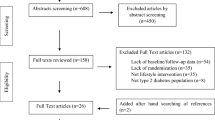Abstract
Over the last decade the situation for people with diabetes mellitus in Europe has changed significantly. The number of patients increases continuously, the age of diagnosis decreases and effective management grows to become a burden for European healthcare systems. In this situation numerous stakeholders try to develop concepts for innovative chronic care management as well as individualized and personalized diabetes management. A major focus is set to activities for early screening and prevention of the diabetes and associated diseases. The present article will give an overview about current achievements in European projects addressing the unmet needs in diabetes management and also to introduce undergoing projects in the field of diabetes prevention and care. Furthermore, the SweetSmart concept will be presented, which is the initiation of a strategy to individualize interventions for the prevention of diabetes and care management. In the current discussion about the management of health care resources it is important to have a strategic vision about a realistic future of innovative chronic care management.
Similar content being viewed by others
References
Whiting DR, Guariguata L, Weil C, Shaw J. IDF diabetes atlas: global estimates of the prevalence of diabetes for 2011 and 2030. Diabetes Res Clin Pract 2011, 94: 311–21.
Zimmet P, Alberti KG, Shaw J. Global and societal implications of the diabetes epidemic. Nature 2001, 414: 782–7.
Rothe U, Muller G, Schwarz PE, et al. Evaluation of a diabetes management system based on practice guidelines, integrated care, and continuous quality management in a Federal State of Germany: a population-based approach to health care research. Diabetes Care 2008, 31: 863–8.
Schwarz PE. Public health implications: translation into diabetes prevention initiatives—four-level public health concept. Med Clin North Am 2011, 95: 397–407, ix.
Keeling A. The UN Summit and beyond: a new era for diabetes. Diabetes Res Clin Pract 2011, 94: 163–5.
Keeling A. Anniversary of vote on UN Summit: progress to date and challenges remaining. Diabetes Res Clin Pract 2011, 92: 409–10.
Schwarz PE. European Diabetes Leadership Forum Report — 25.-26. April 2012 in Copenhagen, Denmark. Network Active in Diabetes Prevention 3: 5. Newsletter 6, 2012.
Schwarz PE, Greaves CJ, Lindström J, Yates T, Davies MJ. Non-pharmacological interventions for the prevention of type 2 diabetes mellitus. Nat Rev Endocrinol 2012, 8: 363–73.
Knowler WC, Barrett-Connor E, Fowler SE, Hamman RF, Lachin JM, et al. Reduction in the incidence of type 2 diabetes with lifestyle intervention or metformin. N Engl J Med 2002, 346: 393–403.
Tuomilehto J, Lindström J, Eriksson JG, et al. Prevention of type 2 diabetes mellitus by changes in lifestyle among subjects with impaired glucose tolerance. N Engl J Med 2001, 344: 1343–50.
Chiasson JL, Josse RG, Gomis R, Hanefeld M, Karasik A, Laakso M; The STOP-NIDDM Trial Research Group. Acarbose for prevention of type 2 diabetes mellitus: the STOP-NIDDM randomised trial. Lancet 2002, 359: 2072–7.
Pan XR, Li GW, Hu YH, et al. (1997) Effects of diet and exercise in preventing NIDDM in people with impaired glucose tolerance. The Da Qing IGT and Diabetes Study. Diabetes Care 1997, 20: 537–44.
Torgerson JS, Hauptman J, Boldrin MN, Sjöström L. XENical in the prevention of diabetes in obese subjects (XENDOS) study: a randomized study of orlistat as an adjunct to lifestyle changes for the prevention of type 2 diabetes in obese patients. Diabetes Care 2004, 27: 155–61.
The Diabetes Prevention Program Research Group. Costs associated with the primary prevention of type 2 diabetes mellitus in the diabetes prevention program. Diabetes Care 2003, 26: 36–47.
Schwarz PE, Muylle F, Valensi P, Hall M, Diabetes Prevention Forum IDFE. The European perspective of diabetes prevention. Horm Metab Res 2008, 40: 511–4.
Halban PA, Boulton AJM, Smith U. A new paradigm for improved co-ordination and efficacy of European biomedical research: taking diabetes as a model. Diabetologia 2013, Dec 13 [Epub ahead of print]; doi: 10.1007/s00125-012-2790-z.
Schwarz PEH, Lindström J, Kissimova-Scarbeck K, et al; the DEPLAN project. The European perspective of type 2 diabetes prevention: diabetes in Europe—prevention using lifestyle, physical activity and nutritional intervention (DE-PLAN) project. Exp Clin Endocrinol Diabetes 2008, 116: 167–172.
Kontogianni MD, Liatis S, Grammatikou S, Perrea D, Katsilambros N, Makrilakis K. Changes in dietary habits and their association with metabolic markers after a non-intensive, community-based lifestyle intervention to prevent type 2 diabetes, in Greece. The DEPLAN study. Diabetes Res Clin Pract 2012, 95: 207–14.
Makrilakis K, Liatis S, Grammatikou S, et al. Validation of the Finnish diabetes risk score (FINDRISC) questionnaire for screening for undiagnosed type 2 diabetes, dysglycaemia and the metabolic syndrome in Greece. Diabetes Metab 2011, 37: 144–51.
Makrilakis K, Liatis S, Grammatikou S, Perrea D, Katsilambros N. Implementation and effectiveness of the first community lifestyle intervention programme to prevent Type 2 diabetes in Greece. The DE-PLAN study. Diabet Med 2010, 27: 459–65.
Sanchez A, Silvestre C, Sauto R, Martinez C, Grandes G. Feasibility and effectiveness of the implementation of a primary prevention programme for type 2 diabetes in routine primary care practice: a phase IV cluster randomised clinical trial. BMC Fam Pract 2012, 13: 109.
Costa B, Barrio F, Cabre JJ, et al. Delaying progression to type 2 diabetes among high-risk Spanish individuals is feasible in real-life primary healthcare settings using intensive lifestyle intervention. Diabetologia 2012, 55: 1319–28.
Schwarz PE, Li J, Reimann M, Schutte AE, Bergmann A, et al. The Finnish Diabetes Risk Score is associated with insulin resistance and progression towards type 2 diabetes. J Clin Endocrinol Metab 2009, 94: 920–6.
Kulzer B, Hermanns N, Gorges D, Schwarz P, Haak T. Prevention of diabetes self-management program (PREDIAS): effects on weight, metabolic risk factors, and behavioral outcomes. Diabetes Care 2009, 32: 1143–6.
Telle-Hjellset V, Råberg Kjøllesdal MK, Bjørge B, et al. The InnvaDiab-DE-PLAN study: a randomised controlled trial with a culturally adapted education programme improved the risk profile for type 2 diabetes in Pakistani immigrant women. Br J Nutr 2013, 109: 529–38.
Hjellset VT, Ihlebæk CM, Bjørge B, Eriksen HR, Høstmark AT. Health-Related Quality of Life, Subjective Health Complaints, Psychological Distress and Coping in Pakistani Immigrant Women With and Without the Metabolic Syndrome: The InnvaDiab-DEPLAN Study on Pakistani Immigrant Women Living in Oslo, Norway. J Immigr Minor Health 2011, 13: 732–41.
Hjellset VT, Bjorge B, Eriksen HR, Hostmark AT. Risk factors for type 2 diabetes among female Pakistani immigrants: the InvaDiab-DEPLAN study on Pakistani immigrant women living in Oslo, Norway. J Immigr Minor Health 2011, 13: 101–10.
Johansen KS, Bjørge B, Hjellset VT, et al. Changes in food habits and motivation for healthy eating among Pakistani women living in Norway: results from the InnvaDiab-DEPLAN study. Public Health Nutr 2010, 13: 858–67.
Hills S, Halban PA. DIAMAP: a road map for diabetes research in Europe. J Diabetes Sci Technol 2011, 5: 794–7.
Danne T, Aschemeier B, Perfetti R; SWEET group. SWEET—where are we heading with international type 1 diabetes registries? Pediatr Diabetes 2012, 13(Suppl 16): 1–4.
Danne T, Lion S, Madaczy L, Veeze H, Raposo F, et al. Criteria for Centers of Reference for pediatric diabetes–a European perspective. Pediatr Diabetes 2012, 13(Suppl 16): 62–75.
Forsander G, Pellinat M, Volk M, et al. Technical solution for data collection, data safety and data privacy legislation: experiences from the SWEET study. Pediatr Diabetes 2012, 13(Suppl 16): 39–48.
Hall M, Felton AM, Henrichs HR, Barnett A (2005) Diabetes — The Policy Puzzle: Towards Benchmaking in the EU 25. International Diabetes Federation European Region and Federation of European Nurses in Diabetes. 103 p.
Felton AM, Henrichs HR, Barnett A, Hall M. Diabetes — The Policy Puzzle: Is Europe Making Progress? International Diabetes Federation European Region and Federation of European Nurses in Diabetes, 2008.
Hall M, Felton A. The Policy Puzzle: the diabetes maze in Europe. British Journal of Diabetes & Vascular Disease 2011, 12: 97.
Schwarz PE, Gruhl U, Bornstein SR, Landgraf R, Hall M, Tuomilehto J. The European perspective on diabetes prevention: development and Implementation of A European Guideline and training standards for diabetes prevention (IMAGE). Diab Vasc Dis Res 2007, 4: 353–7.
Schwarz PE, Lindström J. From evidence to practice—the IMAGE project—new standards in the prevention of type 2 diabetes. Diabetes Res Clin Pract 2011, 91: 138–40.
Paulweber B, Valensi P, Lindström J, et al. A European evidence-based guideline for the prevention of type 2 diabetes. Horm Metab Res 2010, 42: S3–36.
Lindstrom J, Neumann A, Sheppard KE, et al. Take action to prevent diabetes—the IMAGE toolkit for the prevention of type 2 diabetes in Europe. Horm Metab Res 2010, 42(Suppl 1): S37–55.
Pajunen P, Landgraf R, Muylle F, et al; IMAGE Study Group. Quality indicators for the prevention of type 2 diabetes in Europe — IMAGE. Horm Metab Res 42(Suppl 1): S56–63.
Kronsbein P, Fischer MR, Tolks D, et al; IMAGE Study Group. IMAGE — Development of a European curriculum for the training of prevention managers. Br J Diabetes Vasc Dis 2011, 11: 163–7.
Schwarz PE, Gallein G, Ebermann D, et al. global Diabetes Survey-An annual report on quality of diabetes care. Diabetes Res Clin Pract 2013, Jan 18 [Epub ahead of print]; doi: 10.1016/j.diabres.2012.11.008.
Greaves CJ, Sheppard KE, Abraham C, et al; The IMAGE Study Group. Systematic review of reviews of intervention components associated with increased effectiveness in dietary and physical activity interventions. BMC Public Health 2011, 11: 119.
Tuomilehto J, Schwarz P, Lindstrom J. Long-term benefits from lifestyle interventions for type 2 diabetes prevention: time to expand the efforts. Diabetes Care 2011, 34(Suppl 2): S210–4.
Yates T, Davies MJ, Sehmi S, Gorely T, Khunti K. The Pre-diabetes Risk Education and Physical Activity Recommendation and Encouragement (PREPARE) programme study: are improvements in glucose regulation sustained at 2 years? Diabet Med 2011, 28: 1268–71.
Author information
Authors and Affiliations
Corresponding author
Rights and permissions
About this article
Cite this article
Müller, G., Weser, G. & Schwarz, P.E.H. The European perspective of diabetes prevention: The need for individualization of diabetes prevention. J Endocrinol Invest 36, 352–357 (2013). https://doi.org/10.1007/BF03347104
Accepted:
Published:
Issue Date:
DOI: https://doi.org/10.1007/BF03347104




